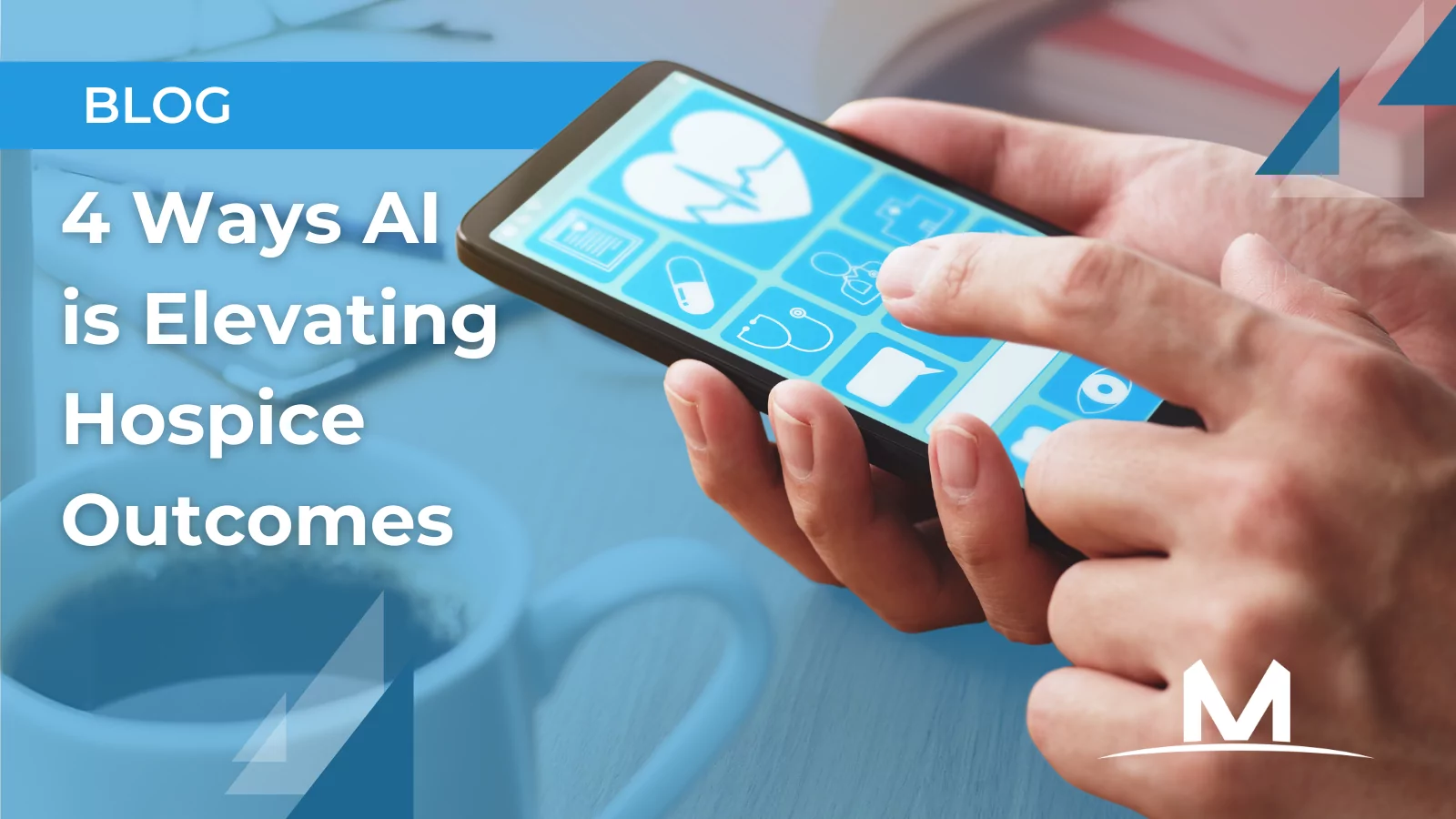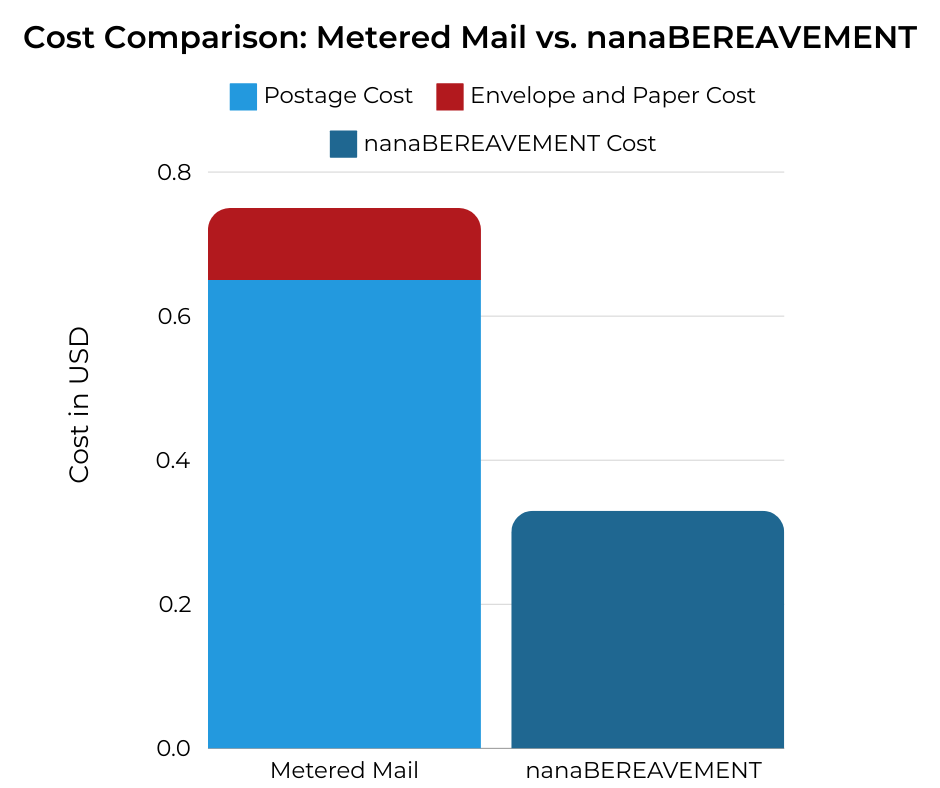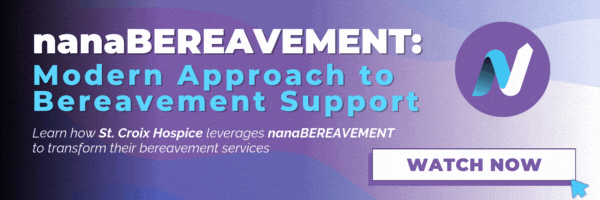4 Ways AI Technology is Elevating Hospice Outcomes

Author: Shea Swenson
Posted: April 15, 2025
Tech-Enabled Bereavement Support [Free Webinar]
The hospice care industry faces mounting challenges, from regulatory compliance and staffing shortages to the increasing demand for high-quality, compassionate care. As agencies seek solutions to enhance patient outcomes while improving operational efficiency, hospice AI technology has emerged as a transformative force.
The integration of artificial intelligence within hospice care has enabled providers to leverage predictive analytics, workflow automation, and personalized care solutions that optimize patient support and streamline agency operations. This shift is not just about adopting new tools—it’s about redefining hospice care to ensure every patient receives timely, tailored, and effective end-of-life support. In this blog, we explore four key ways AI is elevating hospice outcomes and shaping the future of end-of-life care.
Current Landscape of Hospice Care
Hospice care provides patients and their loved ones comprehensive support throughout the end-of-life journey — whether that be physical, mental, or emotional support. And while the hospice industry faces headwinds and uncertainties around compliance, staffing and retention, and emerging tech advancements, one thing remains top priority: quality patient care.
The hospice care cycle can be one of the most challenging times of life for patients and families alike. However, hospice caregivers’ and providers’ passion has pushed the industry to remain strong and adapt while remaining committed to high-quality, timely, and compassionate care. That’s where hospice AI technology comes in.
The increasing trend of technology use and artificial intelligence (AI) in healthcare has introduced new and effective approaches that go beyond traditional medical practices—including holistic strategies aimed at elevating patient care within the hospice setting and optimizations that streamline processes for hospice caregivers.
4 Ways Hospice AI Technology is Enhancing Outcomes
1. Optimized Care Support
Many hospice agencies are adopting emerging technologies like AI to help assist in agency operations. One key driver for this shift is AI’s ability to optimize care support for hospice agencies. AI enables a more personalized approach to care by using medical history, personal needs, and real-time data to create tailored patient care plans and improve quality of life. By monitoring patient data, AI is able to assist care providers in treatment planning and risk assessments for potential falls, wounds, or sudden health deterioration. This allows for more timely and proactive patient intervention, improving care delivery.
Providing optimal care and support for families in hospice extends beyond the end-of-life stage. At Maxwell, we've modernized and enhanced a crucial part of hospice care through technology. nanaBEREAVEMENT, our text-based bereavement support solution, focuses on providing personalized and tailored communication with grieving families of hospice patients.
Our innovative hospice bereavement tool leverages AI to analyze and categorize responses by sentiment, which enables bereavement care teams to focus on those who need immediate support or attention. This feature helps ensure that grieving loved ones receive the proper care and support exactly when they need it most. After all, care does not end with a patient’s passing—timely, customizable support for grieving families is essential to providing the most comprehensive hospice bereavement care.
2. Predictive Analytics
Predictive analytics is a game-changer for hospices. In a nationwide survey of home health, hospice, palliative, and home care professionals, 53% indicated a focus on technology investments in 2025, with 27% prioritizing predictive analytics and patient data management tools1.
Predictive analytics, like the Muse tool from our Solutions Partner, Medalogix, uses intelligent technology to analyze data and make accurate recommendations about care needs, patient well-being, and overall health at close to 95% accuracy2. When properly implemented, tools like Muse provide early identification of patient problems, tailored care plans, and overall enhanced decision-making for hospice caregivers.
Explore Modernized Bereavement Support with AI Features
3. Operational Efficiency
While AI can be used to directly improve patient care quality, it can also be utilized on the back end of hospice agency operations. AI-driven solutions can help streamline processes, assist in documentation, automate workflows, and allocate resources in a more timely and efficient manner.
For example, nVoq, another Maxwell Solutions Partner, offers a voice-to-text solution that transforms the documentation process for care providers. Clinicians are often weighed down by documentation needs that require not only time, but spotless accuracy to avoid scrutiny from CMS. Utilizing voice-to-text documentation solutions creates an instantaneous documentation process, saving countless hours while reducing potential errors and clinician burnout.
With caregiver retention remaining a consistent problem in the home care industry, streamlining back-office processes like communication and documentation through AI technology helps clinicians spend their time focusing on what matters most: providing exceptional care. Maxwell’s tech-enabled solution, NOTIFYnana, is one method helping to address these issues.
NOTIFYnana reduces the number of missed home visits by bridging communication gaps between patients and the care provider. By ensuring seamless coordination between caregivers and patients, NOTIFYnana enhances efficiency and improves patient satisfaction, making it an invaluable tool for agencies striving to deliver top-tier hospice care.
4. Financial Impact
Technology and AI adoptions are proven to pay off in terms of improved outcomes, reduced costs, and improved care quality. In the U.S. healthcare industry, AI can lead to savings of 5-10%, or roughly $200 to $360 billion annually3. For hospice agencies specifically, tech-enabled care advancements come with a multitude of financial considerations, but the return on investment can be substantial.
By integrating AI-driven solutions, hospice agencies can experience cost reductions through decreased hospital readmissions, optimized resource allocation, and minimized administrative expenses. AI-powered automation tools reduce the burden on staff, leading to lower burnout rates and higher retention—ultimately resulting in financial savings through the reduction of costs associated with hiring and training new employees.

For example, nanaBEREAVEMENT reduces costs for agencies by replacing traditional bereavement letters with personalized text messages. Envelopes, stamps, and paper are estimated to cost the provider 76-81¢ per bereavement letter. Whereas, with nanaBEREAVEMENT, provider costs per text are reduced to 33¢, more than a 50% price reduction.
AI also opens doors for improved reimbursement processes by ensuring accurate documentation, streamlined billing, and compliance with regulatory requirements. By reducing errors and increasing accuracy in reporting, agencies can avoid costly penalties while strengthening overall financial performance. For agencies looking to buy or sell, a key stand-out quality is tech adoption. Tech-enabled home care agencies often command higher valuations and are more attractive in mergers and acquisitions due to their operational efficiency and scalability.
Strategic Tech-Enabled Solutions for Hospice Care
As automated technology and predictive analytics continue to expand within hospice and home care at large, so does the availability and quality of care. Amid challenging conditions for caregivers and operational staff, now is a great time to begin investing in growing a tech stack that enhances your agency and empowers greater outcomes for patients and clinicians.
We offer a team of industry-leading experts from all facets of care to assist hospice and home health organizations in implementing AI and other advanced tech solutions that enhance patient care and agency operations. With a comprehensive suite of tech-enabled solutions — like nanaBEREAVEMENT and NOTIFYnana — and a trusted roster of Strategic Partners, we are passionate about helping home care organizations thrive in an evolving post-acute landscape. Discover more about our tech-enabled solutions at www.maxwellhca.com, or schedule a demo by reaching out to [email protected].
This blog was originally published as "Improve Hospice Quality and Care with AI Tools" by Harper Dion on March 19, 2024. The MHA team has since updated this article to ensure accuracy and relevance.
Resources
1. Vossel, Holly. “3 Key Hospice Technology Trends.” Hospice News. January 31, 2025. https://hospicenews.com/2025/01/31/3-key-hospice-technology-trends/
2. Maxwell Healthcare Associates. "Our Partners – Medalogix." https://www.maxwellhca.com/our-partners/medalogix
3. Sahni, Nikhil R., George Stein, Rodney Zemmel, and David Cutler." The Potential Impact of Artificial Intelligence on Health Care Spending." March 2024. National Bureau of Economic Research. http://www.nber.org/chapters/c14760
4. Maxwell Healthcare Associates. "nanaBEREAVEMENT." https://www.maxwellhca.com/technology/nanabereavement

